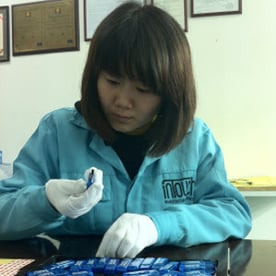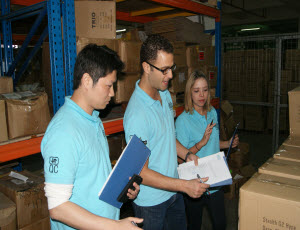 Have you ever thought about corruption and the role it can play in businesses that operate globally?
Have you ever thought about corruption and the role it can play in businesses that operate globally?
InTouch has been inspecting products in China for over ten years and we know all the tricks to the trade. We’ve seen every potential problem involving corruption and we take preventative action.
When we talk about corruption, we're generally not speaking of an obvious and blatant exchange of an envelope full of money from the factory to your inspection staff. Although that kind of action still exists in the factory auditing world, thankfully, those days are pretty much over when it comes to QC inspection.
In this case, we're talking about an overall closeness that develops between the factory and the inspector(s) which, eventually, can work to "blur the lines" of what's acceptable and what's not.
You've got to imagine, especially in rather remote locations or when QC personnel is required to stay on-site at a facility for an extended period of time, they'll spend a lot of time working alongside factory staff. Sometimes there's only one restaurant nearby that serves lunch. So your inspector is, in such cases, dining every day (perhaps even 3 meals a day) with staff members from the factory. It's almost inevitable that he or she is going to develop some sort of camaraderie, if not outright friendship, with the factory.
The day may come when your inspector has to make a tough call while standing in a cold factory far from home, management and co-workers, and needs to report on the quality level of a product. When the “friend” he’s been eating and drinking with the past several days is telling him that he could lose his job based on the inspector’s findings, what’s the inspector going to do?
The situation becomes even worse when your inspectors really start to get close to the factory, participating in activities like KTV, alcohol consumption, or other common late-night pastimes.
The closer you get to the factory, the harder it is to distinguish what IS and IS NOT acceptable based on your own company's expectations. This is the kind of corruption we are talking about, and here are five hard and fast ways to prevent it.
5. Hire female inspectors
In many cases, it's actually the factory boss, or those directly under him, who are getting close to your QC inspectors. Even when it's other staff members, such as production and quality managers, these are also generally men more than 90% of the time.
Men naturally find it much easier to build camaraderie with other men and more than 96% of factory owners in China are men. Although women are not completely immune to being influenced by the factory, in the past ten years of performing inspections in China, we've found that women are significantly less susceptible to the kinds of "relationship building" which the factory will attempt with your inspectors.
Not to mention, one of the most common ways for the factory to influence your inspector's overall disposition is by taking him out to local bathhouses, saunas, and KTVs. In many cases, these places are filled with loosely dressed women, and as the night goes on…well, you get the picture.
Women are impervious to this factory tactic and therefore, not susceptible to such influences.
4. Maintain a documented Code of Ethics
At InTouch, we live by our Code of Ethics. Not only does it hang in oversized posters on the walls of our office, but it is also signed by every InTouch employee AND by a representative at every factory at which we perform services. Key points to include in a code of ethics for your QC inspectors include:
- Prohibiting the acceptance of any gifts, money, bribes or favors of any kind

- Prohibiting the consumption of alcohol while in the presence of factory staff
- Prohibiting the QC inspectors from engaging in any activities with the factory outside of those necessary to specifically complete the job at hand (specifically: Karaoke, sight-seeing, sport or leisure activity, etc.)
- Requiring your QC inspectors to eat all meals separate from the factory in all possible cases and, only when it is impossible to do so, requiring QC inspectors to call their manager and receive clear approval prior to joining in any meals with the factory staff
- Prohibiting your QC from engaging in any business activities outside of their normal work such that would allow them to start a business relationship with the factories outside of your company's duties
3. Make sure your QC team is not dependent on the factory for transportation
(and require receipts for transportation)
In general, you want to try to prevent any situation that puts your inspectors in a position where they feel they must rely on the factory for ANYTHING. The more independent they can operate, the easier it will be for you to control corruption.
So, while it may be a convenient cost-saving option to let the factory pick-up and drop-off your QC at an airport or bus station, for instance, you  should recognize that this cost-saving step comes at a price.
should recognize that this cost-saving step comes at a price.
The moment that your QC is relying on the factory for a ride, they are not independent. This dependence will sit in the back of their mind as the inspection runs late into the evening and the likelihood that the shipment will "pass" becomes greater and greater, even if the shipment ought to fail.
Think about it - being far away from the nearest town when it’s late at night and you have no means of transportation is not a comfortable feeling. This kind of discomfort is exactly what can lead to a lapse of judgment for what is "passable" and what is not for your production. While it may not be cost effective for each of your QC to have their own car (and driver), the cost of arranging private transportation is generally minimal in comparison to the cost of your order.
Not only does InTouch Services provide product inspection and auditing services for you in China, but we can also audit your own QC teams and provide consulting and training services to help you improve your China operations. If you're interested in such services please contact your InTouch Client Manager or email us at info@intouchquality.com.
2. Audit your QC regularly, either internally or independently
One of the most effective measures for policing potential breaches of your code of ethics is by actively auditing the operations of QC staff by sending out other staff (internal auditors) to physically verify, first hand, the work of the QC inspectors.
 Auditors should wait outside the factory during the inspection process, preferably in their own vehicles, and then enter the factory immediately as the QC team departs. The purpose of this kind of audit is not to catch the QC inspectors "in the act" of receiving a bribe or some kind of benefit from the factory but to verify that the work of the QC inspectors is being carried out properly and according to your company policies.
Auditors should wait outside the factory during the inspection process, preferably in their own vehicles, and then enter the factory immediately as the QC team departs. The purpose of this kind of audit is not to catch the QC inspectors "in the act" of receiving a bribe or some kind of benefit from the factory but to verify that the work of the QC inspectors is being carried out properly and according to your company policies.
This is effective because the more comfortable that your QC inspectors become with the factory the more likely they are to get lazy in their inspection process and start to relax their work ethic during the inspection. These are symptoms of integrity issues which can be observed in such audits.
Key activities which should take place during such audits include:
- Physically checking for evidence that the correct number of units and sample size was actually pulled and checked. This may be verified, for example, by looking for double tape, since the boxes should have been opened and then re-sealed by the factory.
- Questioning factory staff members in order to verify exactly what took place during the inspection. This may include questions related to any help or favors that the QC may have requested of the factory.
- Quick inspection of the product and related documentation so as to verify that the report written by the QC staff is accurate.
1. HR and culture building - hire the right people, and take care of them
By far, the most effective way to preserve integrity within your organization is to hire the right people and motivate them. We know…easier said than done. But, there are some simple steps that can be taken starting from the job application phase of the HR process that can help you build a strong team.
Certain hiring tactics that should be implemented include:
- Check references.
- Check to see if the candidate’s family members are involved in the China manufacturing industry and evaluate how such connections may affect their decisions.
- Require candidates to interview with more than one manager at your company.
- Implement a trial period where management can observe the new inspector on the job.
 Also, if your inspector feels as though they are a valued part of your company, this will reduce their tendency to deviate from your company's policies. So go to lengths make them feel like part of your company's family. That's what we do at InTouch, where twice a year we bring our entire staff together for multiple-day trainings and retreats, including intensive team-building.
Also, if your inspector feels as though they are a valued part of your company, this will reduce their tendency to deviate from your company's policies. So go to lengths make them feel like part of your company's family. That's what we do at InTouch, where twice a year we bring our entire staff together for multiple-day trainings and retreats, including intensive team-building.
We all know that the concept of "saving face" and avoiding disgrace is of major importance in China. Use this to your advantage, and make sure your QC know that they are part of a close-knit team -- one which cares about them and one they should care about. Simply by conforming to the cultural norms of China, your employees will be loyal to your organization and ensure they are not shamed by their "family” of colleagues and co-workers.
Conclusion
In summation, corruption can be a major problem for you if you’re manufacturing in China. But it doesn’t have to be. You CAN protect yourself by:
- Hiring as many female inspectors for your QC team as you can. They are likely to stay loyal to your organization and typically will be less susceptible than most male inspectors to tactics by factory management and staff to turn them.
- Maintaining a documented code of ethics so your employees know where the company stands on policy. Prominently display the code of eth
 ics in your office and make sure that each employee signs a copy.
ics in your office and make sure that each employee signs a copy. - Make sure your QC team doesn’t have to rely on factory-provided transportation. You don’t want an inspector to have to make the difficult choice between a ride home and an honest inspection report.
- Audit your QC regularly, even if it’s done internally with your own auditors. Having one auditor check the work of another in the same firm is better than nothing.
- Hire the right people and take care of them. Preventing corruption means taking action to stop it before it crops up. You can do this through a more prudent interview process and by cultivating a family atmosphere among your staff.
Follow these five Easy Steps, and your investment will be reflected in good value and quality products & services to your customers, without the burden of having to police your own QC people.






